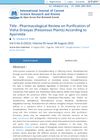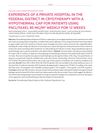 August 2022 in “International Journal of Current Science Research and Review”
August 2022 in “International Journal of Current Science Research and Review” Ayurveda can make poisonous plants medicinal through specific purification processes.
 July 2022 in “International Journal of Applied Pharmaceutics”
July 2022 in “International Journal of Applied Pharmaceutics” The optimized caffeine formula improved hair growth and penetrated all skin layers.
 June 2022 in “Farmacevtičnij časopis”
June 2022 in “Farmacevtičnij časopis” The conclusion is that the technology for making "Biosedum plus" gel, which treats radiation skin damage, is validated.
 February 2022 in “Research Journal of Biotechnology”
February 2022 in “Research Journal of Biotechnology” Eclipta alba L. is a medicinal plant with many health benefits, including treating diseases and promoting hair growth.
February 2022 in “Cosmetic Dermatology” Permanent hair waving uses chemicals to create long-lasting curls.
 January 2022 in “bioRxiv (Cold Spring Harbor Laboratory)”
January 2022 in “bioRxiv (Cold Spring Harbor Laboratory)” The gp130 receptor helps in tissue regeneration and disease progression, and manipulating it could improve healing and prevent disease.
 November 2021 in “Research Square (Research Square)”
November 2021 in “Research Square (Research Square)” The new caffeine cream works better for hair growth than existing products.
Pseudofolliculitis causes painful bumps and dark spots from shaving, especially in people with curly hair, and can be treated by changing shaving habits and using specific topical treatments.
 January 2021 in “Mastology”
January 2021 in “Mastology” Scalp cooling therapy helped over 80% of women keep at least half their hair during chemotherapy.
September 2020 in “Himalayan Journal of Health Sciences” Papaya leaves have many health benefits and medicinal uses.
January 2020 in “Estetologia Medyczna i Kosmetologia” Most ingredients in anti-hair loss products lack scientific proof of effectiveness.
 January 2019 in “Current research in diabetes & obesity journal”
January 2019 in “Current research in diabetes & obesity journal” A woman with type 2 diabetes developed alopecia areata, suggesting a link between the two autoimmune conditions.
 January 2019 in “Journal of Pharmacognosy and Phytochemistry”
January 2019 in “Journal of Pharmacognosy and Phytochemistry” The methanolic fruit extract of Citrullus colocynthis contains bioactive compounds that may support its use in traditional medicine and drug development.
 September 2017 in “The journal of investigative dermatology/Journal of investigative dermatology”
September 2017 in “The journal of investigative dermatology/Journal of investigative dermatology” Scarred skin in lichen planopilaris loses immune cells due to a decrease in a specific protein in skin cells.
 September 2017 in “Journal of Investigative Dermatology”
September 2017 in “Journal of Investigative Dermatology” HIF-1A may aid hair growth, Backhousia citriodora improves skin, autologous cells stabilize hair loss, infrared thermography assesses alopecia, and a new treatment preserves hair.
September 2017 in “The journal of investigative dermatology/Journal of investigative dermatology” The hexosamine pathway helps maintain healthy skin by affecting the skin's structure and possibly increasing hair follicle stem cells.
 September 2017 in “Journal of Investigative Dermatology”
September 2017 in “Journal of Investigative Dermatology” Fermented mackerel oil was found to promote hair growth by activating certain cell signals and increasing cell growth.

Melampus might have cured Proetus' daughters, who possibly had ergotism or Cushing's syndrome, using the herb Helleborus niger, but a mix of factors could have caused their symptoms.
 August 2016 in “The journal of investigative dermatology/Journal of investigative dermatology”
August 2016 in “The journal of investigative dermatology/Journal of investigative dermatology” The hexosamine pathway helps protect skin cells from stress and may improve skin and hair health.
Hair care products can cause skin irritation and allergies.
 January 2015 in “Endocrine updates”
January 2015 in “Endocrine updates” Bariatric surgery patients need careful before and after surgery care for safety and long-term health.
 January 2015 in “Hair therapy & transplantation”
January 2015 in “Hair therapy & transplantation” Some botanical products may help increase hair growth in people with alopecia, but more research is needed.
December 2010 in “Journal of Oriental Medicine” Black bean, wheat, and rice bran extracts can improve hair growth and quality.
January 2010 in “대한미용학회지” The herbal extracts effectively promoted hair growth.
 May 2004 in “International Journal of Cosmetic Science”
May 2004 in “International Journal of Cosmetic Science” Melanogenesis inhibitors like kojic acid and niacinamide can reduce inflammation and pigment production in skin cells.
 September 1997 in “JEADV. Journal of the European Academy of Dermatology and Venereology/Journal of the European Academy of Dermatology and Venereology”
September 1997 in “JEADV. Journal of the European Academy of Dermatology and Venereology/Journal of the European Academy of Dermatology and Venereology” Blocking IL-1 could help treat some hair loss conditions; alopecia affects liver detox systems; spironolactone is better than finasteride for female hair growth; focusing on the catagen hair phase could lead to new alopecia treatments.
 June 2022 in “International journal of drug delivery technology”
June 2022 in “International journal of drug delivery technology” Convolvulus arvensis ethanolic extract can potentially promote hair growth and reduce hair loss.
May 2022 in “The Journal of Clinical Pharmacology” Metformin reduces certain hormone levels in men with early-onset hair loss.
 July 2014 in “Faculty Opinions – Post-Publication Peer Review of the Biomedical Literature”
July 2014 in “Faculty Opinions – Post-Publication Peer Review of the Biomedical Literature” Applying valproic acid on the scalp increased hair growth in men with hair loss.
 280 citations,
July 2018 in “Antioxidants”
280 citations,
July 2018 in “Antioxidants” Treatments that reduce oxidative stress and fix mitochondrial problems may help heal chronic wounds.





















